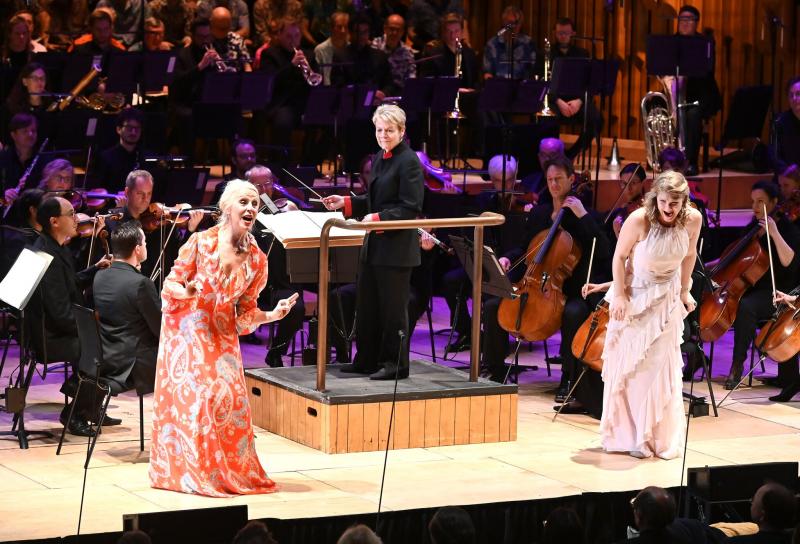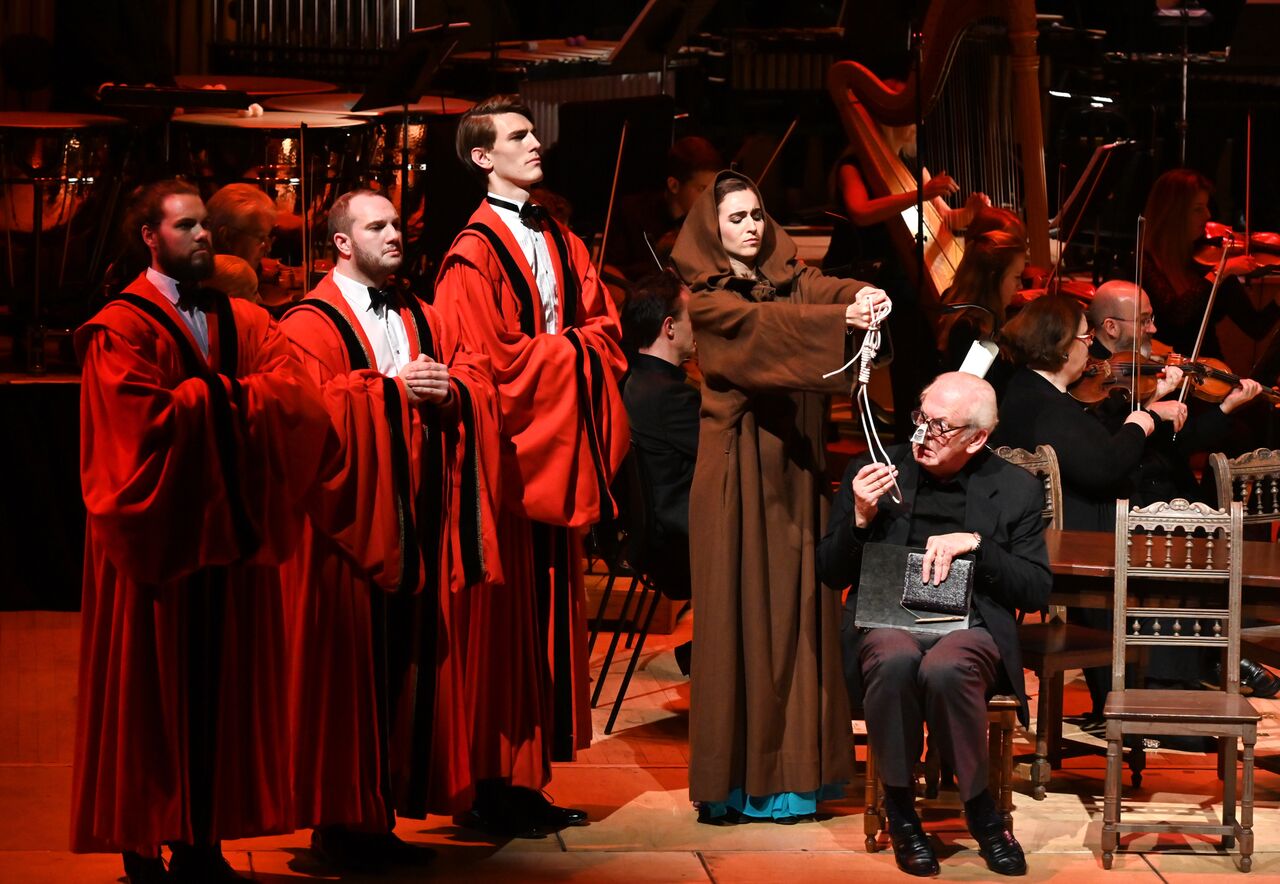Candide, LSO, Alsop, Barbican review - nearly the best of all possible | reviews, news & interviews
Candide, LSO, Alsop, Barbican review - nearly the best of all possible...
Candide, LSO, Alsop, Barbican review - nearly the best of all possible...
Bernstein centenary reaches a smashing conclusion with a flawed masterpiece

When the biggest laugh in Bernstein’s Candide goes to a narrator’s mention of how nationalism was sweeping through Europe, you may have a problem. Still, the Bernstein Centenary has been among the best of all possible anniversary celebrations this year and at the LSO Candide - the great man’s bonkers operetta-ish take on Voltaire, a flawed masterpiece with a succession of glorious tunes and snappy lyrics - could have been its apex. At times, it was.
If it wasn’t wholly up there, that is in large part due to the conundrum the piece poses about how to bring it convincingly to the stage (or here, semi-stage). The Voltaire original is – as our narrator, Panglosse/Sir Thomas Allen, remarked a few times too many – a "picaresque" novel in which adventures take place in every paragraph. The illegitimate Candide grows up with an uncle’s family in Westphalia, falls in love with his cousin Cunegonde and is tutored, together with them all, by Panglosse, whose philosophy is Optimism: this is the Best of All Possible Worlds. Then they all discover that it isn’t, through non-stop adventures around the globe: war, shipwreck, innumerable miraculous escapes, multiple resurrections (“You were dead, you know…”) and, in Eldorado, the most boring paradise on earth.
Implicitly, that means the action needs a tight, slick pace, and here, with a somewhat over-stuffed narration to explain the story, it risked the occasional sag. But the work has an awkward dramatic structure: the action may be full of character and colour, but it simply continues until Candide and Cunegonde have had enough and decide to settle down. There seems no particular reason for them to sing the ever-stirring "Let Our Garden Grow" exactly when they do, other than that their audience has been there for two and a half hours and it’s home time.  But my, oh my, that music. Those lyrics. That singing. And some really intelligent conducting. Marin Alsop, who studied with Bernstein, brought the score beefy lyricism, biting irony and sensible tempi. It might be tempting to take certain numbers faster, but you wouldn’t be able to hear, let alone sing, the words. Those lyrics - by Richard Wilbur, Stephen Sondheim, John Latouche, Lillian Helman and Bernstein himself - need to be centre stage, and were.
But my, oh my, that music. Those lyrics. That singing. And some really intelligent conducting. Marin Alsop, who studied with Bernstein, brought the score beefy lyricism, biting irony and sensible tempi. It might be tempting to take certain numbers faster, but you wouldn’t be able to hear, let alone sing, the words. Those lyrics - by Richard Wilbur, Stephen Sondheim, John Latouche, Lillian Helman and Bernstein himself - need to be centre stage, and were.
As Cunegonde, Jane Archibald relished all the coloratura glory, bringing the house down with a "Glitter and be Gay" that laid on with a trowel contrast, hypocrisy, fun and sheer exultation. Her duet with Anne Sofie von Otter’s Old Lady, "We Are Women", was a joyous highlight too, with Alsop, looking round laconically from her podium, turning orchestral interjections into an implied commentary. Allen was a suitably blustery, endearing Panglosse and Leonardo Capalbo brought the unfortunate non-hero’s numbers a lovely Italianate glow. Von Otter shone bright with charisma and multifarious accents in "I am Easily Assimilated". Tenor Thomas Atkins and baritone Marcus Farnsworth (pictured above on the left with Allen, seated) made the most of a quantity of smaller roles each. The rest of the cast was cruelly uncredited in the programme, including Paquette – a definite solo role – and two adorable, pink-eared Eldorado sheep.
But it was the London Symphony Chorus, above all, who seemed to be having the time of their lives and injected this performance with a pizzazz that was a hundred per cent irresistible.
Add comment
The future of Arts Journalism
You can stop theartsdesk.com closing!
We urgently need financing to survive. Our fundraising drive has thus far raised £49,000 but we need to reach £100,000 or we will be forced to close. Please contribute here: https://gofund.me/c3f6033d
And if you can forward this information to anyone who might assist, we’d be grateful.

Subscribe to theartsdesk.com
Thank you for continuing to read our work on theartsdesk.com. For unlimited access to every article in its entirety, including our archive of more than 15,000 pieces, we're asking for £5 per month or £40 per year. We feel it's a very good deal, and hope you do too.
To take a subscription now simply click here.
And if you're looking for that extra gift for a friend or family member, why not treat them to a theartsdesk.com gift subscription?
more Opera
 Albert Herring, English National Opera review - a great comedy with depths fully realised
Britten’s delight was never made for the Coliseum, but it works on its first outing there
Albert Herring, English National Opera review - a great comedy with depths fully realised
Britten’s delight was never made for the Coliseum, but it works on its first outing there
 Carmen, English National Opera review - not quite dangerous
Hopes for Niamh O’Sullivan only partly fulfilled, though much good singing throughout
Carmen, English National Opera review - not quite dangerous
Hopes for Niamh O’Sullivan only partly fulfilled, though much good singing throughout
 Giustino, Linbury Theatre review - a stylish account of a slight opera
Gods, mortals and monsters do battle in Handel's charming drama
Giustino, Linbury Theatre review - a stylish account of a slight opera
Gods, mortals and monsters do battle in Handel's charming drama
 Susanna, Opera North review - hybrid staging of a Handel oratorio
Dance and signing complement outstanding singing in a story of virtue rewarded
Susanna, Opera North review - hybrid staging of a Handel oratorio
Dance and signing complement outstanding singing in a story of virtue rewarded
 Ariodante, Opéra Garnier, Paris review - a blast of Baroque beauty
A near-perfect night at the opera
Ariodante, Opéra Garnier, Paris review - a blast of Baroque beauty
A near-perfect night at the opera
 Cinderella/La Cenerentola, English National Opera review - the truth behind the tinsel
Appealing performances cut through hyperactive stagecraft
Cinderella/La Cenerentola, English National Opera review - the truth behind the tinsel
Appealing performances cut through hyperactive stagecraft
 Tosca, Royal Opera review - Ailyn Pérez steps in as the most vivid of divas
Jakub Hrůša’s multicoloured Puccini last night found a soprano to match
Tosca, Royal Opera review - Ailyn Pérez steps in as the most vivid of divas
Jakub Hrůša’s multicoloured Puccini last night found a soprano to match
 Tosca, Welsh National Opera review - a great company reduced to brilliance
The old warhorse made special by the basics
Tosca, Welsh National Opera review - a great company reduced to brilliance
The old warhorse made special by the basics
 BBC Proms: The Marriage of Figaro, Glyndebourne Festival review - merriment and menace
Strong Proms transfer for a robust and affecting show
BBC Proms: The Marriage of Figaro, Glyndebourne Festival review - merriment and menace
Strong Proms transfer for a robust and affecting show
 BBC Proms: Suor Angelica, LSO, Pappano review - earthly passion, heavenly grief
A Sister to remember blesses Puccini's convent tragedy
BBC Proms: Suor Angelica, LSO, Pappano review - earthly passion, heavenly grief
A Sister to remember blesses Puccini's convent tragedy
 Orpheus and Eurydice, Opera Queensland/SCO, Edinburgh International Festival 2025 review - dazzling, but distracting
Eye-popping acrobatics don’t always assist in Gluck’s quest for operatic truth
Orpheus and Eurydice, Opera Queensland/SCO, Edinburgh International Festival 2025 review - dazzling, but distracting
Eye-popping acrobatics don’t always assist in Gluck’s quest for operatic truth
 MARS, Irish National Opera review - silly space oddity with fun stretches
Cast, orchestra and production give Jennifer Walshe’s bold collage their all
MARS, Irish National Opera review - silly space oddity with fun stretches
Cast, orchestra and production give Jennifer Walshe’s bold collage their all

Comments
The layout of the programme